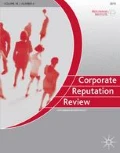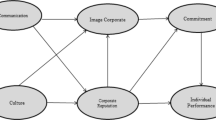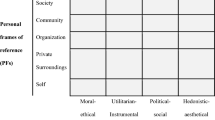Abstract
This study draws on previous studies that have highlighted a link between how employees evaluate their employer in terms of corporate reputation and their resulting citizenship behavior. The research is rooted in social identity theory and self-determination theory and is based on empirical data consisting of answers to an online questionnaire of 415 employees. The results indicate that employees’ perceptions of how outsiders experience the organization’s demeanor positively affects employees’ behavior toward the employing organization. In addition, the authors find support for both a mediation effect of job satisfaction and a moderation effect of self-determination. The authors discuss theoretical and managerial implications of the study.

Similar content being viewed by others
Notes
PER_7=Financial soundness; PER_8=Long-term investment value. We ran our analysis with and without PER_7 and PER_8 and did not find deviating results. However, we decided to report the six-indicator solution due to better overall model fit.
For organizational tenure, we had missing values, which is why we do not report the values in Table 4. Testing with a subsample of n=213 with complete data for tenure, organizational tenure had a slightly significant influence on JS and OCB_HO but did not change the direction or magnitude of hypothesized effects.
References
Alexy, O. and Leitner, M. (2011) ‘A fistful of dollars: Are financial rewards a suitable management practice for distributed models of innovation?’ European Management Review, 8 (3), 165–185.
Armstrong, J.S. and Overton, T.S. (1977) ‘Estimating non-response bias in mail surveys’, Journal of Marketing Research, 14 (3), 396–402.
Asha, C.S. and Jyothi, P. (2013) ‘Internal branding: A determining element of organizational citizenship behavior’, The Journal of Contemporary Management Research, 7 (1), 1–27.
Ashforth, B.E. and Mael, F. (1989) ‘Social identity theory and the organization’, Academy of Management Review, 14 (1), 20–39.
Bagozzi, R.P. and Yi, Y. (1988) ‘On the evaluation of structural equation models’, Journal of the Academy of Marketing Science, 16 (1), 74–94.
Baron, R.M. and Kenny, D.A. (1986) ‘The moderator-mediator variable distinction in social psychological research: Conceptual, strategic, and statistical considerations’, Journal of Personality and Social Psychology, 51 (6), 1173–1182.
Bartels, J., Pruyn, A., de Jong, M. and Joustra, I. (2007) ‘Multiple organizational identification levels and the impact of perceived external prestige and communication climate’, Journal of Organizational Behavior, 28 (2), 173–190.
Bartikowski, B. and Walsh, G. (2011) ‘Investigating mediators between corporate reputation and customer citizenship behavior’, Journal of Business Research, 64 (1), 39–44.
Bartikowski, B., Walsh, G. and Beatty, S.E. (2011) ‘Culture and relationship ages as moderators in the corporate reputation role and loyalty relationship’, Journal of Business Research, 64 (9), 966–972.
Bateman, T. and Organ, D.W. (1983) ‘Job satisfaction and the good soldier: The relationship between affect and employee citizenship’, Academy of Management Journal, 26 (4), 587–595.
Bell, S.J. and Menguc, B. (2002) ‘The employee-organization relationship, organizational citizenship behavior, and superior service quality’, Journal of Retailing, 78 (2), 131–146.
Bentler, P.M. and Bonett, D.G. (1980) ‘Significance tests and goodness of fit in the analysis of covariance structures’, Psychological Bulletin, 88 (3), 588–606.
Brief, A.P. and Motowidlo, S.J. (1986) ‘Prosocial organizational behaviors’, Academy of Management Review, 11 (4), 710–725.
Byrne, Z.S. (2005) ‘Fairness reduces the negative effects of organizational politics on turnover intentions, citizenship behavior and job performance’, Journal of Business and Psychology, 20 (2), 175–200.
Cable, D. and Turban, D.B. (2003) ‘The value of organizational reputation in the recruitment context: A brand equity perspective’, Journal of Applied Social Psychology, 33 (11), 2244–2266.
Cadwallader, S., Jarvis, C.B., Bitner, M.J. and Ostrom, A.L. (2010) ‘Frontline employee motivation to participate in service innovation implementation’, Journal of the Academy of Marketing Sciences, 38 (2), 219–239.
Cammann, C., Fichman, M., Jenkins, D. and Klesh, J. (1983) ‘Assessing the attitudes and perceptions of organization members’, in, S. Seashore, E. Lawler, P. Mirvis and C. Cammann (eds.), Assessing Organizational Change: A Guide to Methods, Measures and Practices, Wiley, New York, NY, pp. 71–138.
Carmeli, A. (2004) ‘The link between organizational elements, perceived external prestige and performance’, Corporate Reputation Review, 6 (4), 314–331.
Carmeli, A. (2005) ‘Perceived external prestige, affective commitment, and citizenship behaviors’, Organization Studies, 26 (3), 443–464.
Carson, K.D., Baker, D.S. and Lanier, P.A. (2014) ‘The role of individual cultural traits and proactivity in an organizational setting’, Management Research Review, 37 (4), 348–366.
Chang, A., Chiang, H.-H. and Han, T.-S. (2012) ‘A multilevel investigation of relationships among brand-centered HRM, brand psychological ownership, brand citizenship behaviors, and customer satisfaction’, European Journal of Marketing, 46 (5), 626–662.
Chin, W., Thatcher, J.B. and Wright, R.T. (2012) ‘Assessing common method bias: Problems with the ULMC technique’, MIS Quarterly, 36 (3), 1003–1019.
Davies, G., Chun, R. and Kamins, M.A. (2010) ‘Reputation gaps and the performance of service organizations’, Strategic Management Journal, 31 (5), 530–546.
Deci, E.L. and Ryan, R.M. (1985) Intrinsic Motivation and Self-Determination in Human Behavior, Plenum Press, New York, NY.
Deci, E.L., Ryan, R.M., Gagné, M., Leone, D.R., Usunov, J. and Kornazheva, B.P. (2001) ‘Need satisfaction, motivation, and well-being in the work organizations of a former eastern bloc country: A cross-cultural study of self-determination’, Personality and Social Psychology Bulletin, 27 (8), 930–942.
Dekas, K.H., Bauer, T.N., Welle, B., Kurkoski, J. and Sullivan, S. (2013) ‘Organizational citizenship behavior, version 2.0: A review and qualitative investigation of OCBs for knowledge workers at google and beyond’, Academy of Management Journal, 27 (3), 219–237.
Dierdorff, E.C., Rubin, R.S. and Bachrach, D.G. (2010) ‘Role expectations as antecedents of citizenship and the moderating effects of work context’, Journal of Management, 38 (2), 573–598.
Dutton, J.E., Dukerich, J.M. and Harquail, C.V. (1994) ‘Organizational images and member identification’, Administrative Science Quarterly, 39 (2), 239–263.
Eberl, M. and Schwaiger, M. (2005) ‘Corporate reputation: Disentangling the effects on financial performance’, European Journal of Marketing, 39 (7/8), 838–854.
Eriksson, K., Johanson, J., Majkgård, A. and Sharma, D.D. (1997) ‘Experiential knowledge and cost in the internationalization process’, Journal of International Business Studies, 28 (2), 337–360.
Erkutlu, H. and Chafra, J. (2013) ‘Effects of trust and psychological contract violation on authentic leadership and organizational deviance’, Management Research Review, 36 (9), 828–848.
Evanschitzky, H., Baumgarth, C., Hubbard, R. and Armstrong, J.S. (2007) ‘Replication research’s disturbing trend’, Journal of Business Research, 60 (4), 411–415.
Fombrun, C.J. (1996) Reputation: Realizing Value from the Corporate Image, Harvard Business School Press, Massachusetts, Boston, MA.
Foote, D.A. and Tang, T.L.P. (2008) ‘Job satisfaction and organizational citizenship behavior (OCB): Does team commitment make a difference in self-directed teams?’ Management Decision, 46 (6), 933–947.
Fornell, C. and Larcker, D.F. (1981) ‘Evaluating structural equation models with unobservable variables and measurement error’, Journal of Marketing Research, 18 (1), 382–388.
Fryxell, G.E. and Wang, J. (1994) ‘The fortune corporate ‘reputation’ index: Reputation for what?’ Journal of Management, 20 (1), 1–14.
Fu, H., Li, Y. and Duan, Y. (2014) ‘Does employee-perceived reputation contribute to citizenship behaviour? The mediating role of organizational commitment’, International Journal of Contemporary Hospitality Management, 26 (4), 593–609.
Fuller, J.B., Hester, K., Barnett, T., Frey, L., Relyea, C. and Beu, D. (2006) ‘Perceived external prestige and internal respect: New insights into the organizational identification process’, Human Relations, 59 (6), 815–846.
Gagné, M. and Deci, R. (2005) ‘Self-determination theory and work motivation’, Journal of Organizational Behavior, 26 (4), 331–362.
George, J.M. and Brief, A.P. (1992) ‘Feeling good – Doing good: A conceptual analysis of the mood at work –Organizational spontaneity relationship’, Psychological Bulletin, 112 (2), 310–329.
Gerlitz, J.-Y. and Schupp, J. (2005) ‘Zur Erhebung der Big-Five-basierten Persönlichkeitsmerkmale im SOEP’, DIW Research Notes 4.
Gunter, B. and Furnham, A. (1996) ‘Biographical and climate predictors of job satisfaction and pride in organization’, Journal of Psychology, 130 (2), 193–208.
Hameed, I., Roques, O. and Arain, G.A. (2013) ‘Nonlinear moderating effect of tenure on organizational identification (OID) and the subsequent role of OID in fostering readiness for change’, Group and Organization Management, 38 (1), 101–127.
Hammond, S.A. and Slocum, J.W. (1996) ‘The impact of prior firm financial performance on subsequent corporate reputation’, Journal of Business Ethics, 15 (2), 159–165.
Hayes, A. (2013) An Introduction to Mediation, Moderation, and Conditional Process Analysis, The Guilford Press, New York, NY.
Helm, S. (2011) ‘Employees’ awareness of their impact on corporate reputation’, Journal of Business Research, 64 (7), 657–663.
Helm, S. (2013) ‘A matter of reputation and pride: Associations between perceived external reputation, pride in membership, job satisfaction and turnover intentions’, British Journal of Management, 24 (4), 542–556.
Hu, L.T. and Bentler, P.M. (1999) ‘Cutoff criteria for fit indexes in covariance structure analysis: Conventional criteria versus new alternatives’, Structural Equation Modeling, 6 (1), 1–55.
Johnson, A.S. and Ashforth, B.E. (2008) ‘Externalization of employment in a service environment: The role of organizational and customer identification’, Journal of Organizational Behavior, 29 (3), 287–309.
Kotha, S., Rajgopal, S. and Rindova, V. (2001) ‘Reputation building and performance: An empirical analysis of the top-50 pure internet firms’, European Management Journal, 19 (6), 571–586.
Kovjanic, S., Schuh, S.C., Jonas, K., van Quaquebeke, N. and van Dick, R. (2012) ‘How do transformational leaders foster positive employee outcomes? A self-determination-based analysis of employees’ needs as mediating links’, Journal of Organizational Behavior, 33 (8), 1031–1052.
Koys, D.J. (2001) ‘The effects of employee satisfaction, organizational citizenship behavior, and turnover on organizational effectiveness: A unit-level, longitudinal study’, Personnel Psychology, 54 (1), 101–114.
Li, N., Liang, J. and Crant, J.M. (2010) ‘The role of proactive personality in job satisfaction and organiational citizenship behavior: A relational perspective’, Journal of Applied Psychology, 95 (2), 395–404.
Lindell, M.K. and Whitney, D.J. (2001) ‘Accounting for common method variance in cross-sectional research designs’, Journal of Applied Psychology, 86 (1), 114–121.
Luria, G., Gal, I. and Yagil, D. (2009) ‘Employees’ willingness to report service complaints’, Journal of Service Research, 12 (2), 156–174.
MacKenzie, S.B., Podsakoff, P.M. and Ahearne, M. (1998) ‘Some possible antecedents and consequences of in-role and extra-role salesperson performance’, Journal of Marketing, 62 (3), 87–98.
Men, L.R. (2014) ‘Internal reputation management: The impact of authentic leadership and transparent communication’, Corporate Reputation Review, 17 (4), 254–272.
Menguc, B., Auh, S., Fisher, M. and Haddad, A. (2013) ‘To be engaged or not to be engaged: The antecedents and consequences of service employee engagement’, Journal of Business Research, 66 (11), 2163–2170.
Mishra, A.K. and Spreitzer, G.M. (1998) ‘Explaining how survivors respond to downsizing: The roles of trust, empowerment, justice, and work redesign’, Academy of Management Review, 23 (3), 567–588.
Mishra, S.K. (2013) ‘Perceived external prestige and employee outcomes: Mediation effect of organizational identification’, Corporate Reputation Review, 16 (3), 220–233.
Moorman, R.H. (1993) ‘The influence of cognitive and affective based job satisfaction measures on the relationship between satisfaction and organizational citizenship behavior’, Human Relations, 46 (6), 759–776.
Netemeyer, R.G., Boles, J.S., McKee, D.O. and McMurrian, R. (1997) ‘An investigation into the antecedents of organizational citizenship behaviors in a personal selling context’, Journal of Marketing, 61 (3), 85–98.
Niehoff, B.P. and Moorman, R.H. (1993) ‘Justice as a mediator of the relationship between methods of monitoring and organizational citizenship behavior’, Academy of Management Journal, 36 (3), 527–556.
Nielsen, T.M., Hrivnak, G.A. and Shaw, M. (2009) ‘Organizational citizenship behavior and performance: A meta-analysis of group-level research’, Small Group Research, 40 (5), 555–577.
Organ, D.W. (1988) Organizational Citizenship Behavior: The Good Soldier Syndrome, Lexington Books, Lexington.
Organ, D.W. (1990) ‘The motivational basis of organizational citizenship behavior’, Research in Organizational Behavior, 12 (1), 43–72.
Organ, D.W. and Ryan, K. (1995) ‘A meta analytic review of attitudinal and dispositional predictors of organizational citizenship behavior’, Personnel Psychology, 48 (4), 775–802.
Owuamalam, C.K. and Zagefka, H. (2011) ‘Downplaying a compromised social image: The effect of meta-stereotype valence on social identification’, European Journal of Social Psychology, 41 (4), 528–537.
Perryer, C., Jordan, C., Firns, I. and Travaglione, A. (2010) ‘Predicting turnover intentions: The interactive effects of organizational commitment and perceived organizational support’, Management Research Review, 33 (9), 911–923.
Podsakoff, P.M. and MacKenzie, S.B. (1994) ‘Organizational citizenship behaviors and sales unit effectiveness’, Journal of Marketing Research, 31 (3), 351–363.
Podsakoff, P.M. and Organ, D.W. (1986) ‘Self-reports in organizational research: Problems and prospects’, Journal of Management, 12 (4), 531–544.
Podsakoff, P.M., Ahearne, M. and MacKenzie, S.B. (1997) ‘Organizational citizenship behavior and the quantity and quality of work group performance’, Journal of Applied Psychology, 82 (2), 262–270.
Podsakoff, P.M., MacKenzie, S.B., Paine, J.B. and Bachrach, D.G. (2000) ‘Organizational citizenship behaviors: A critical review of the theoretical and empirical literature and suggestions for future research’, Journal of Management, 26 (3), 513–563.
Podsakoff, P.M., MacKenzie, S.B., Lee, J.-Y. and Podsakoff, N. (2003) ‘Common method bias in behavioral research: A critical review of the literature and recommended remedies’, Journal of Applied Psychology, 88 (5), 879–903.
Podsakoff, N.P., Whiting, S.W., Podsakoff, P.M. and Blume, B.D. (2009) ‘Individual- and organizational-level consequences of organizational citizenship behaviors: A meta-analysis’, Journal of Applied Psychology, 94 (1), 122–141.
Podsakoff, N.P., Podsakoff, P.M., MacKenzie, S.B., Maynes, T.D. and Spoelma, T.M. (2014) ‘Consequences of unit‐level organizational citizenship behaviors: A review and recommendations for future research’, Journal of Organizational Behavior, 35 (S1), S87–S119.
Preacher, K.J., Rucker, D.D. and Hayes, A.F. (2007) ‘Addressing moderated mediation hypotheses: Theory, methods, and prescriptions’, Multivariate Behavioral Research, 42 (1), 185–227.
Pugh, D.P., Groth, M. and Hennig-Thurau, T. (2011) ‘Willing and able to fake emotions: A closer examination of the link between emotional dissonance and employee well-being’, Journal of Applied Psychology, 96 (2), 377–390.
Roberts, P.W. and Dowling, G.R. (2002) ‘Corporate reputation and sustained superior financial performance’, Strategic Management Journal, 23 (12), 1077–1093.
Rose, C. and Thomsen, S. (2004) ‘The impact of corporate reputation on performance: Some Danish evidence’, European Management Journal, 22 (2), 201–210.
Rotundo, M. and Sackett, P.R. (2002) ‘The relative importance of task, citizenship, and counterproductive performance to global ratings of job performance: A policy-capturing approach’, Journal of Applied Psychology, 87 (1), 66–80.
Rupp, D.E., Holbu, S. and Grandey, A.A. (2007) ‘A cognitive-emotional theory of customer injustice and emotional labor: Implications for customer service, fairness theory, and the multifoci perspective’, in, D. De Cremer (ed.), Advances in the Psychology of Justice and Effect, IAP, Charlotte, NC, pp. 199–226.
Schriesheim, C.A., Castro, S.L. and Yammarino, F.J. (2000) ‘Investigating contingencies: An examination of the impact of span of supervision and upward controllingness on leader – Member exchange using traditional and multivariate within-and between-entities analysis’, Journal of Applied Psychology, 85 (5), 659–677.
Shen, Y., Jackson, T. and Ding, C. et al. (2014) ‘Linking perceived organizational support with employee work outcomes in a Chinese context: Organizational identification as a mediator’, European Management Journal, 32 (3), 406–412.
Sluss, D.M. and Ashforth, B.E. (2007) ‘Relational identity and identification: Defining ourselves through work relationships’, Academy of Management Review, 32 (1), 9–32.
Smidts, A., Pruyn, A.T.H. and Van Riel, C.B.M. (2001) ‘The impact of employee communication and perceived external prestige on organizational identification’, Academy of Management Journal, 44 (5), 1051–1062.
Smith, L.G.E., Amiot, C.E., Callan, V.J., Terry, D. and Smith, J.R. (2012) ‘Getting new staff to stay: The mediating role of organizational identification’, British Journal of Management, 23 (1), 45–64.
Smith, C.A., Organ, D.W. and Near, J.P. (1983) ‘Organizational citizenship behavior: Its nature and antecedents’, Journal of Applied Psychology, 68 (4), 653–663.
Spreitzer, G.M. (1996) ‘Social structural characteristics of psychological empowerment’, Academy of Management Journal, 39 (2), 483–504.
Staufenbiel, T. and Hartz, C. (2000) ‘Organizational citizenship behavior: Entwicklung und erste Validierung eines Messinstrumentes’, Diagnostica, 46 (2), 73–83.
Steiger, J.H. (2007) ‘Understanding the limitations of global fit assessment in structural equation modeling’, Personality and Individual Differences, 42 (5), 893–898.
Stone-Romero, E.F. and Rosopa, P.J. (2008) ‘The relative validity of inferences about mediation as a function of research design characteristics’, Organizational Research Methods, 11 (2), 326–352.
Tajfel, H. and Turner, J.C. (1986) ‘The social identity theory of intergroup behavior’, in, S. Worchel and W. Austin (eds.), Psychology of Intergroup Relations 2nd edn. Nelson-Hall, Chicago, IL, pp. 7–24.
Van Dyne, L., Graham, J.W. and Dienesch, R.M. (1994) ‘Organizational citizenship behavior: Construct redefinition, measurement, and validation’, Academy of Management Journal, 37 (4), 765–802.
Vorauer, J.D., Main, K.J. and O’Connell, G.B. (1998) ‘How do individuals expect to be viewed by members of lower status groups? Content and implications of meta-stereotypes’, Journal of Personality and Social Psychology, 75 (4), 917–937.
Walsh, G. and Beatty, S.E. (2007) ‘Customer-based corporate reputation of a service firm: Scale development and validation’, Journal of the Academy of Marketing Science, 35 (1), 127–143.
Walsh, G., Bartikowski, B. and Beatty, S.E. (2014) ‘Impact of customer-based corporate reputation on non-monetary and monetary outcomes: The roles of commitment and service context risk’, British Journal of Management, 25 (2), 166–185.
Walsh, G., Mitchell, V.-W., Jackson, P.R. and Beatty, S.E. (2009) ‘Examining the antecedents and consequences of corporate reputation: A customer perspective’, British Journal of Management, 20 (2), 187–203.
Wasti, A.A. and Can, Ö. (2008) ‘Affective and normative commitment to organization, supervisor, and coworkers: Do collectivist values matter?’ Journal of Vocational Behavior, 73 (3), 404–413.
Wiedmann, K.-P., Hennings, N., Schmidt, S. and Wuestefeld, T. (2013) ‘Brand heritage and its impact on corporate reputation: Corporate roots as a vision for the future’, Corporate Reputation Review, 16 (3), 187–205.
Williams, L.J. and Anderson, S.E. (1991) ‘Job satisfaction and organizational commitment as predictors of organizational citizenship and in-role behaviors’, Journal of Management, 17 (3), 601–617.
Yen, H.R. and Niehoff, B.P. (2004) ‘Organizational citizenship behaviors and organizational effectiveness: Examining relationships in Taiwanese banks’, Journal of Applied Social Psychology, 34 (8), 1617–1637.
Author information
Authors and Affiliations
Appendix
Rights and permissions
About this article
Cite this article
Schaarschmidt, M., Walsh, G. & Ivens, S. Perceived External Reputation as a Driver of Organizational Citizenship Behavior: Replication and Extension. Corp Reputation Rev 18, 314–336 (2015). https://doi.org/10.1057/crr.2015.19
Published:
Issue Date:
DOI: https://doi.org/10.1057/crr.2015.19




